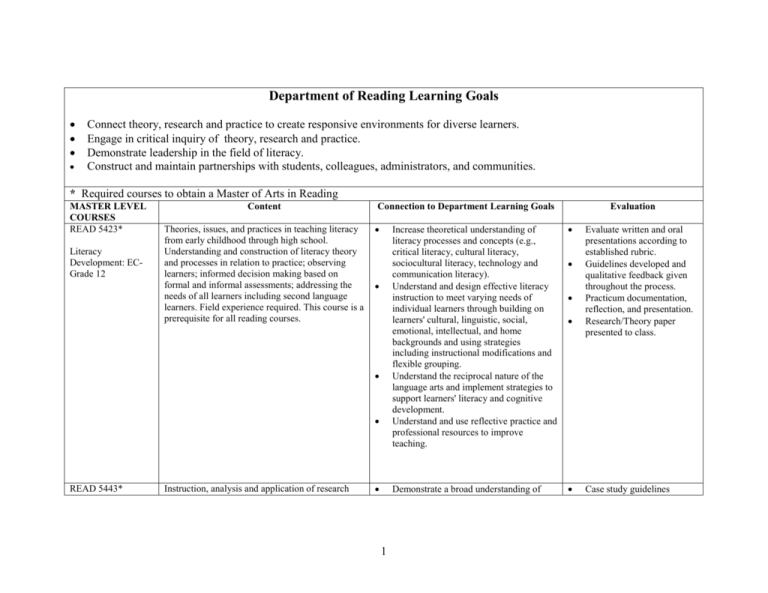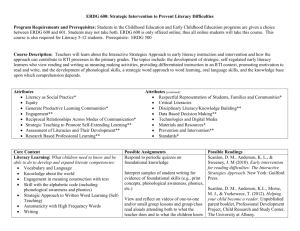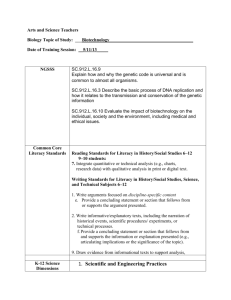Department of Reading Learning Goals
advertisement

Department of Reading Learning Goals Connect theory, research and practice to create responsive environments for diverse learners. Engage in critical inquiry of theory, research and practice. Demonstrate leadership in the field of literacy. Construct and maintain partnerships with students, colleagues, administrators, and communities. * Required courses to obtain a Master of Arts in Reading MASTER LEVEL COURSES READ 5423* Literacy Development: ECGrade 12 Content Theories, issues, and practices in teaching literacy from early childhood through high school. Understanding and construction of literacy theory and processes in relation to practice; observing learners; informed decision making based on formal and informal assessments; addressing the needs of all learners including second language learners. Field experience required. This course is a prerequisite for all reading courses. Connection to Department Learning Goals READ 5443* Instruction, analysis and application of research 1 Evaluation Increase theoretical understanding of literacy processes and concepts (e.g., critical literacy, cultural literacy, sociocultural literacy, technology and communication literacy). Understand and design effective literacy instruction to meet varying needs of individual learners through building on learners' cultural, linguistic, social, emotional, intellectual, and home backgrounds and using strategies including instructional modifications and flexible grouping. Understand the reciprocal nature of the language arts and implement strategies to support learners' literacy and cognitive development. Understand and use reflective practice and professional resources to improve teaching. Demonstrate a broad understanding of Evaluate written and oral presentations according to established rubric. Guidelines developed and qualitative feedback given throughout the process. Practicum documentation, reflection, and presentation. Research/Theory paper presented to class. Case study guidelines Department of Reading Learning Goals Connect theory, research and practice to create responsive environments for diverse learners. Engage in critical inquiry of theory, research and practice. Demonstrate leadership in the field of literacy. Construct and maintain partnerships with students, colleagues, administrators, and communities. Literacy Assessment and Instruction based formal and informal literacy assessments; use of assessments to guide responsive instruction; ability to communicate outcomes and standards to various audiences. Field experience required. current theories, research, and pedagogy in literacy assessment, changing concepts of literacy, and the social and cultural nature of literacy learning. Demonstrate knowledge of a variety of reading assessment materials. Demonstrate an understanding of the relationship that exists between a teacher’s philosophy of literacy and literacy acquisition and the ensuing assessment/instructional program. Access (information technology, computer software, text-based sources, etc.) and analyze various reading, writing, and language arts lessons and instructional materials and approaches with respect to theoretical orientation, research base, lesson design, etc.. Conduct in-depth inquiries in the form of case studies of individual students. Communicate outcomes of instruction and assessment in written form for colleagues and administrators as well as other stakeholders. READ 5453* Theories and practices related to literacies across a Apply a variety of comprehension 2 developed from a broad range of instruments by instructors. Oral and written presentations of case studies. Evaluate written and oral presentations according to established rubric. Conduct a practicum and Department of Reading Learning Goals Connect theory, research and practice to create responsive environments for diverse learners. Engage in critical inquiry of theory, research and practice. Demonstrate leadership in the field of literacy. Construct and maintain partnerships with students, colleagues, administrators, and communities. Processes & Strategies for Comprehending Texts variety of print and non-print texts and genres. Focus on providing optimal environments for comprehension and interpretation of texts and on developing students’ independent uses of strategies for engaging with these texts. theories/models. Analyze strategic activity that supports and extends comprehension, fluency, and vocabulary. Demonstrate knowledge of characteristics of types of texts and genres as it relates to reading comprehension. Apply comprehension instruction across curricular areas. READ 5463* Practicum in Literacy: Analysis of Teaching and Mentoring Clinical experiences in classrooms, small group and individual instruction; diagnosis, analysis and teaching utilizing assessment data and research based practices; application of mentoring and coaching strategies for collaborating with professional colleagues and parents. Demonstrate and understanding of effective professional development in a professional development setting (eg. conference, school district). Apply leadership skills while conducting a practice coaching session teachers. Develop and apply instructional plan based on application of knowledge of assessment and of effective teaching for diverse 3 analysis of data for student/teacher interactions that support comprehending and comprehension instruction. Conduct a research synthesis related to a topic that contributes to understanding comprehending processes and/or comprehension instruction. Create an independent study for supporting the teaching of comprehension in classrooms. Evaluate written and oral presentations according to established rubric. Compile a case study that includes diagnostic and instructional data to show increased learning for an identified student. Participate in coaching sessions directed to support instruction of student(s) involved in diagnostic Department of Reading Learning Goals Connect theory, research and practice to create responsive environments for diverse learners. Engage in critical inquiry of theory, research and practice. Demonstrate leadership in the field of literacy. Construct and maintain partnerships with students, colleagues, administrators, and communities. READ 5503* Phonological and Orthographic Systems in Literacy Learning READ 5493* Research in Literacy: Responsive Action in Schools Focuses on language processes, including phonological and orthograhic language systems related to literacy development. Research and theory related to letters, sounds and their relationship, word analysis, and spelling will be used to critique and evaluate reading programs and design customized assessment and instruction. Critical reading, evaluation and design of research in literacy; understanding of research trends in literacy; effective communication of research for decision-making in literacy at the program-level. literacy learners. Demonstrate understanding of language processes, how language is learned, and language diversity (e.g., dialect, diverse first languages). Demonstrate understanding of research and theory supporting the role of phonological and phonemic awareness, the alphabetic principle, and spelling in literacy acquisition. Design, implement, and report plans for assessment and instruction for two or more children differing in phonological and orthographic development. Critically evaluate, select, and use a variety of instructional materials, including digital media, to facilitate children’s learning of letters, sounds and their relationship, word analysis, and spelling. Demonstrate ability to locate, analyze, synthesize, and critique research related to literacy instruction. Select and critique research that is useful to make literacy program decisions in schools. Develop relevant research questions and design research processes that can be used 4 teaching sessions. Write research critiques related to phonological and orthographic development. Develop instructional frameworks for teaching sessions with children. Reports on teaching sessions Develop a written report for each child, documenting the child's starting point, performance in the teaching sessions, and current phonological and orthographic understandings. Evaluate written and oral presentations according to established rubric. Write critiques of research studies using knowledge of research standard. Conduct formal review of research related to a specific literacy topic. Write a formal research paper using standard Department of Reading Learning Goals Connect theory, research and practice to create responsive environments for diverse learners. Engage in critical inquiry of theory, research and practice. Demonstrate leadership in the field of literacy. Construct and maintain partnerships with students, colleagues, administrators, and communities. to respond to issues and instructional needs in schools. Communicate effectively about literacy instruction for diverse populations both inside and outside the educational community. READ 5513* Literacy and the Diverse Learner READ 5963* Seminar in Literacy Research Theories, issues, and practices of literacy instruction in various academic settings for EC-12 learners of diverse linguistic, cultural, economic, and academic backgrounds. Completion of master’s coursework required. Students design, conduct, and report literacy research related to individual areas of interest. Conduct indepth inquiries of current issues related to literacy and diverse learners Require practica experience with a diverse learner required Demonstrate skill in designing and conducting research on issues related to literacy, reading education, and related area. Collaborate with colleagues during the process of designing, conducting, and reporting research. READ 5523 Supervision and the Teaching of Reading Emphasis on knowledge of reading theories and research-based practices in the development and implementation of effective literacy programs. In addition, emphasis will be placed on effective Demonstrate an understanding of major theoretical perspectives in reading and their relationship to practice in designing 5 research methods and style manual. Present research findings to an audience of peers. Evaluate written and oral presentations according to established rubric. Oral and written presentations of critique of texts which include components of diverse learners. Write an autobiography of literacy development Present research through scholarly writing and at least one other presentation format. Rubric developed for institutional effectiveness for written research and presentation. Self-assessment of oral presentation. Develop an implementation plan for a critical issue related to the supervision of Department of Reading Learning Goals Connect theory, research and practice to create responsive environments for diverse learners. Engage in critical inquiry of theory, research and practice. Demonstrate leadership in the field of literacy. Construct and maintain partnerships with students, colleagues, administrators, and communities. leadership practices for establishing collaboration, communication, and professional development in the design, implementation and evaluation of literacy programs. and implementing effective reading instruction. Apply knowledge of research based practice in the design and critique of reading programs as well as recommend instructional materials for effective literacy instruction. Understand the relationship of curriculum, assessment and instruction in the design, implementation, and evaluation of reading programs. Demonstrate knowledge of student reading needs across grade levels and different student populations. Apply knowledge of reading research and theory to plan and implement professional development that supports effective literacy instruction. Understand the role of effective leadership in supervising reading programs. Use professional resources to expand knowledge of effective literacy instruction both now and in the future. Explore how children think and learn. Demonstrate critical understanding of the role of assessment in planning for instruction. READ 5533 Foundations of Early Literacy A course focusing on literacy teaching and learning in the early grades. Emphasis on reading, writing, and oral language. Attention to observation and assessment, appropriate 6 reading programs. Construct a theory-practicebeliefs chart that reflects the current knowledge in the field of reading research. Prepare a synthesis of how theory, practice, and beliefs about reading influence the supervision of reading. Oral and written presentation of case studies (high, average, and low progress students) focused Department of Reading Learning Goals Connect theory, research and practice to create responsive environments for diverse learners. Engage in critical inquiry of theory, research and practice. Demonstrate leadership in the field of literacy. Construct and maintain partnerships with students, colleagues, administrators, and communities. selection and use of books and materials. Organization and management, ways of teaching that support children in building strong processing systems in reading and writing. Organize the classroom to enhance learning. Teach for strategic processing in reading and writing with individuals and small groups. Use professional resources to continue learning about literacy development of young children. Examine the rationale for enhancing literacy in content areas and how to facilitate this understanding in schools. Demonstrate knowledge of characteristics of specific texts and strategies for reading and writing a variety of texts and of various means for assessing students in content areas. Critique existing research in the area of content literacy and its relationship to practice. READ 5543 Reading in the Content Areas Rationale and principles for teaching reading and related communication skills in content-area subjects; emphasis on strategies for instruction in text comprehension, text production, and vocabulary development. READ 5473 Early Detection in Reading Focus on the administration and interpretation of Marie Clay's Diagnostic Survey and intervention procedures that will support the at-risk beginning reader. In addition to observing children and teachers interacting behind a one-way glass, all enrolled in the course will work with four children while learning procedures. Prerequisite: Permission of instructor. Develop skillful observations and descriptions of literacy processing. Critically analyze teaching interactions designed for early gains and accelerated progress. Review lesson components and program rationales 7 on during the course of the year. Written documentation of growth and instructional effectiveness for each student. Practicum documentation, reflection, and presentation. Lesson demonstration to class that illustrates content literacy practices. Research/Theory project related to use of informational text presented to class. Administer, score, and provide written analysis of literacy observation tasks on all children to be tutored. Write Predictions of Progress for all children Department of Reading Learning Goals Connect theory, research and practice to create responsive environments for diverse learners. Engage in critical inquiry of theory, research and practice. Demonstrate leadership in the field of literacy. Construct and maintain partnerships with students, colleagues, administrators, and communities. Demonstrate evidence of growth in literacy theory and effectiveness with students. READ 5483 Early Intervention in Reading Focus on the refinement of instructional procedures used with at-risk beginning readers. Attention is directed to teacher decision-making while working with four children. All enrolled in the course are involved in teaching and observing children behind a one-way glass. Prerequisite: Permission of instructor. Demonstrate knowledge and understanding of Reading Recovery theory and practice. Work collaboratively with first-grade teachers and school team. Actively participate during teacher leader on-site visits to discuss and receive feedback on teaching. Participate in active problem solving during visits. Communicate with parents of Reading Recovery students. Work with administrators in school to strengthen support of the RR program and for the children served. Work collaboratively with other Reading Recovery professionals in problem solving on behalf of children and promoting the program’s success. 8 before tutoring. Maintain daily and weekly records for each child, recording all that happens in the lesson. Analyze running records to make sound decisions for the tutoring. Maintain accurate daily and weekly records for each child. Analyze records and use them to make instructional decisions. Test/Retest all children served for the end-of -year data collection. Participate in Random Sample Testing and electronic data input.








